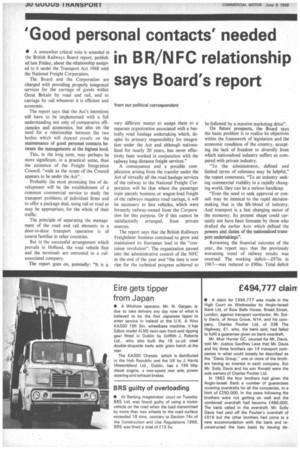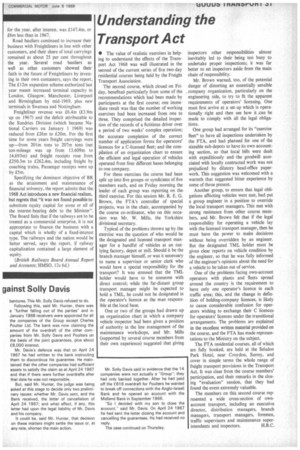'Good personal contacts' needed in BR/NFC relationship says Board's report
Page 32

Page 33

If you've noticed an error in this article please click here to report it so we can fix it.
from our political correspondent
• A somewhat critical note is sounded in the British Railways Board report, published last Friday, about the relationship assigned to it under the Transport Act 1968 with the National Freight Corporation.
The Board and the Corporation are charged with providing properly integrated services for the carriage of goods within Great Britain by road and rail, and to carriage by rail.whenever it is efficient and economic.
The report says that the Act's intentions will have to be implemented with a full understanding not only of comparative efficiencies and economics, but also on the need for a relationship between the two bodies which will depend greatly on the maintenance of good personal contacts between the managements at the highest level.
This, in the long term, may perhaps be more significant, in a practical sense, than the existence of the Freight Integration Council, "wide as the scope of the Council appears to be under the Act".
Probably the most promising line of development will be the establishment of a common commercial service to study the transport problems of individual firms and to offer a package deal, using rail or road as may be appropriate, for the whole of their traffic.
The principle of separating the management of the road and rail elements in a door-to-door transport operation is of course familiar in other countries.
But in the successful arrangement which prevails in Holland, the road vehicle fleet and the terminals are entrusted to a railassociated company.
The report goes on, pointedly: "It is a very different matter to assign them to a separate organization associated with a basically road haulage undertaking which, despite its primary responsibility for integration under the Act and although nationalized for nearly 20 years, has never effectively been worked in conjunction with the railway long-distance freight services."
A consequence and a possible complication arising from the transfer under the Act of virtually all the road haulage services of the railway to the National Freight Corporation will be that where the passenger train parcels business or wagon-load freight of the railways requires road cartage, it will be necessary to hire vehicles, which were formerly railway-owned from the Corporation for this purpose. Or if this cannot be satisfactorily arranged, from private sources.
The report says that the British Railways Freightliner business continued to grow and maintained its European lead in the "container revolution". The organization passed into the administrative control of the NFC at the end of the year and "the time is now ripe for the technical progress achieved to
be followed by a massive marketing drive". On future prospects, the Board says the basic problem is to realize its objectives within the framework of legislation and the economic condition of the country, accepting the lack of freedom to diversify from which nationalized industry suffers as corn-. pared with private industry_ "To the administrator, defined and limited terms of reference may be helpful," the report comments. "To an industry seeking commercial viability in a rapidly changing world, they can be a serious handicap.
"Even the need to seek approval or consult may be inimical to the rapid decisionmaking that is the life-blood of industry. And transport is a fast changing sector of the economy. Its present shape could certainly not have been foreseen by those who drafted the earlier Acts which defined the powers and duties of the nationalized transport undertakings".
Reviewing the financial outcome of the year, the report says that the previously worsening trend of railway results was reversed. The working deficit—£97m in 1967—was reduced to £90m. Total deficit for the year, after interest, was £ I47.4m, or £6m less than in 1967.
Road hauliers continued to increase their business with Freightliners in line with other customers, and their share of total carryings remained at about 25 per cent throughout the year. Several road hauliers as well as other customers showed their faith in the future of Freightliners by investing in their own containers, says the report, The £12m expansion scheme authorized last year meant increased terminal capacity in London. Glasgow, Manchester. Liverpool and Birmingham by mid-1969. plus new terminals in Swansea and Nottingham.
Freightliner revenue was £6.4rn (£3.9m up on 1967) and the deficit attributable to the Sundries Division (which became National Carriers on January 1 1969) was reduced from £26m to £20m. For the first time for some years freight carryings were up—from 201m tons to 207m tons (net ton-mileage was up from 13.609m to 14,693m) and freight receipts rose from £250.3m to £262.4m, including freight by coaching trains. Passenger receipts were up by £5m.
Specifying the dominant objective of BR as the attainment and maintenance of financial solvency, the report admits that the 1968 Act introduces a new financial realism, but regrets that "it was not found possible to substitute equity capital for some or all of the interest-bearing debt to the Minister". The Board feels that if the railways are to be treated as a commercial enterprise, it is not appropriate to financethe business with a capital which is wholly of a fixed-interest type. The railways and the nation would be better served, says the report, if railway capitalization contained a large element of equity.
(British Railways Board Annual Report and Accounts; HMSO, I2s 6d.)


























































































































